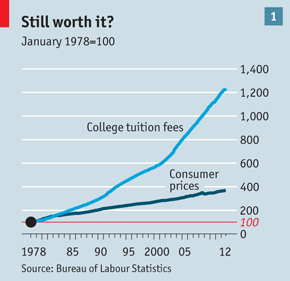More research has brought me back and this time it brings me into the realm of college graduate incomes as I search to find out how they compare to the increase in tuition rates that were reported in my previous post. Also in my previous post you will find a video that shows a graph that represents the earning rate for college graduates compared to just high school graduates. In 1980 it says the college graduate earns an average of 50% more than a high school graduate, while in 2008 they earned over 90% more than a high school graduate. This statistic tends to go against my claim of the decline in value of a college degree over time and should definitely be considered when comparing the monetary value of the average degree from year to year, however, it does not account for the 9 years following 2008.
The idea that the college education value is increasing overtime is supported by the article, "Here's What the Average Grad Makes Right Out of College" by Susie Poppick. It looks at over 45,000 different graduates and shows what the salaries are for the average college graduate right out of college. Susie starts out by explaining how much the average graduate income has increased just in the past two years. A 5% difference in annual income in 2016 resulting in over $2,400 increased in overall annual income since 2014. This article was written in 2015 so it projects the annual income for graduates, depending on their degree in 2016.

Contradicting this argument, the article "Higher
Education, Not what it used to be" by The Economist, states many points about why the value of the degree is seeming to decrease as tuition and loan rates rise. It says that the rate of increase for a college education is rising almost five times the amount that of which inflation is rising, represented by this graph provided in this article by the Bureau of Labour Statistics. It also mentions how student debt is rising as it says the average student in 2011 had $26,000 of debt, double the average debt per student 15 years prior. The article also explains that universities are spending far less money on instructors to advance education, and far more money in just about every other category of spending. As time moves on, education should always be advancing. If we are paying more and more for an education we should be getting more from it.
These articles are similar as they both state that overall college graduates make far more than their high school graduate counterparts or people with no degree. There are many benefits even still today that outweigh the costs, however, there are many arguments as to why a degree may be declining in value and this is where these articles differ. I would assume that the authors of these articles would argue on the value of the degree, as they both tend to look at it in different perspectives.
I still believe that the degree is decreasing in value, but the more I research the more I find out how beneficial degrees still remain today. Other questions I am beginning to have are; How much does college spending effect the tuition costs? Take the new CSU stadium in Fort Collins, CO for example. Even if a student never enters the new stadium in their tenure at CSU, they still have to pay the increased tuition to help pay for it if they want to attend this college. As costs for these types of investments increase tremendously, this kind of spending, to me, factors largely in the debate of whether or not the cost of tuition makes a degree remain as valuable as it once was.
Hi Dillon,
ReplyDeleteYour topic is the one I'm most looking forward to learning more about since I am a student in college and I want to make every dollar count. I agree having a degree would help on many levels with income, but we still pay an arm and a leg to get to that income and some degrees don't even count in the job field, and those students are then forced to pay off money for a degree they will never use. I believe trade schools are the best way to go because they learn about their career and are not forced to take history and other classes that don't even apply to their job. That then adds up and makes students pay more money for a class that is not even going to help get the job. I like seeing your charts that you added, it added inside to your topic, and I look forward to reading more about your research.
Dillon,
ReplyDeleteAnother good post. I look forward to seeing where you decide to place value on education. Did you see the new tuition program in New York? It seems to have some flaws, but a generally positive move for education. Great point about universities spending habits, I would like to research how much of a CSU student's tuition goes toward athletics. Considering the football team brings in a huge amount of money for the school, I understand wanting a more improved stadium. But to let that burden fall on the students seems outrageously unneccessary. I think it is interesting that the article from The Economist said colleges are spending less on instructors. From what I understand, professors make pretty good money and play a bigger role in school spending than this article states. Do you believe that all degrees are equal, or do you think college is worth it for some and not others?